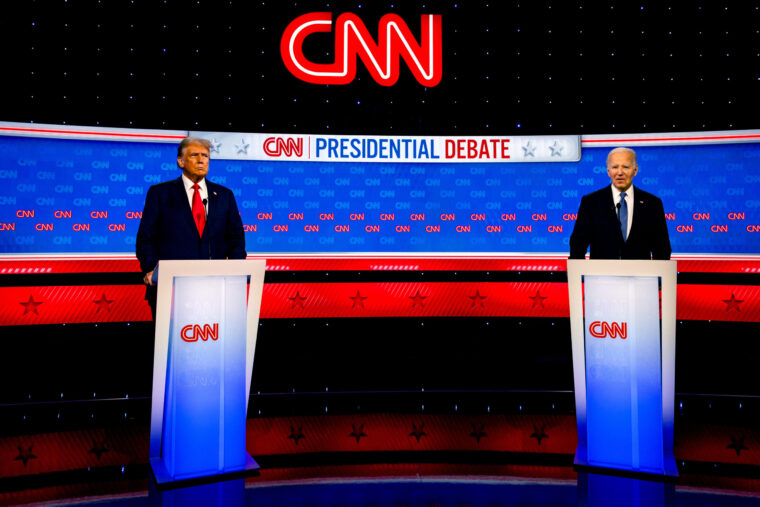The first debate between the two main candidates for the November 2024 US presidential election took place on 27 June — unusually, more than five months ahead of the vote. As expected, it was brutal, reflecting the deepening polarisation of American political life and the extreme animosity between the two contenders. It was also, unsurprisingly, an extremely difficult performance for Joe Biden — described as a disaster or a shipwreck. According to CNN, 67% of those surveyed believed Donald Trump had “won” the debate — a resounding verdict, given how divisive the Republican candidate remains. Hesitant and at times incoherent, Joe Biden delivered the most catastrophic performance in such a media exercise since the very first presidential debate between John F. Kennedy and Richard Nixon in 1960. His deteriorating health, increasingly scrutinised in the media, was a key factor — as was his inability to elevate the debate or avoid the trap laid by his opponent. Already evident since the beginning of the primaries in January 2024, the prospect of Joe Biden remaining in the White House now borders on fantasy — unless one entertains the unlikely scenario of Donald Trump being disqualified for legal reasons, or an even more unlikely surge in mobilisation among Democratic voters, not to mention support from independents, whose votes will once again be decisive. As national conventions dominate the American political summer, the conclusion is clear: Joe Biden has virtually no chance of defeating Donald Trump in the election. Chronicle of a defeat foretold— it is now up to the Democrats to find a solution.
Time to Open Our Eyes
No other election captures global attention quite like the American presidential race. This is, of course, due to the power held by the occupant of the White House, but also to the intense media coverage that surpasses that of any other foreign contest. Take France, for instance: while there is an abundance of analysis and reporting on the US presidential race, elections in Germany, Italy, or Spain — to name just a few — receive far less attention.
This fascination with the US election, however, is undermined by a kind of appropriation of American political debates by media outlets that now act more as partisans than commentators — the result of a near-Manichaean polarisation that feels misplaced, especially considering that, aside from dual citizens, the French don’t vote for the American president any more than they vote for the German chancellor. Of course, everyone is free to take a stance, to comment, to criticise. But the media also have a duty to inform — to go beyond positions and present the facts, not just their interpretation.
We are already seeing reports on the debate describing — how could it be otherwise? — Joe Biden’s disastrous performance. Yet it is remarkable that it took until late June, and the end of the primaries, for many to admit what observers of US political life have surely known for months, if not longer.
It is therefore time to open our eyes to the political spectacle offered by the world’s greatest democracy. This is not a matter for mockery — especially not in France — but a humbling lesson for those who mistake their hopes for reality, focusing on Donald Trump’s legal troubles while ignoring the fact that his opponent’s chances of victory are diminishing by the day.
Key States That Will Be Nearly Impossible to Win
The American electoral system places a premium on a handful of battleground states that must be won to secure enough electoral college votes. National poll figures are therefore of limited value — at best indicative. As things stand, Trump is ahead of Biden in most national polls — a damning sign, given that Democrats have consistently outnumbered Republicans nationwide for over 20 years, without always winning the presidency.
In the majority of these key states, Trump is in the lead — in some cases by wide margins that now seem difficult to close. Florida and Ohio are no longer even considered battleground states, while Michigan and Wisconsin — traditionally Democratic — are now viewed as in play. How can the Democrats’ inability to mobilise at the local level be explained?
To understand this, one should look more to the 2016 election than to 2020, which was marked by the Covid-19 pandemic. Hillary Clinton — the Democratic nominee and media favourite — suffered a significant setback in many battleground states, including Democratic strongholds like Michigan and Wisconsin, where Trump won in a major upset.
But was it really such a surprise? During the Democratic primaries, Hillary Clinton had been soundly beaten by Bernie Sanders in both states and made the fatal error of not campaigning there, reasoning that if voters backed Sanders, they would never vote for Trump. She focused instead on other states — including safe bets like California — while Trump wisely campaigned in the very places his rival had ignored.
Let’s be clear: elections are won on the ground, not from the White House or the editorial boards of East Coast newspapers. And it is difficult to imagine Joe Biden criss-crossing the country holding rallies, even if that alone would be enough.
A Democratic Electorate More Divided Than Ever
While many Republicans who dislike Trump have resigned themselves to a third candidacy, Democrats today are deeply divided — as illustrated by the recent pro-Palestinian protests on university campuses. Rallying the Democratic base is now the party’s greatest challenge, and Joe Biden is not the man to unite the various political strands of his own camp.
The paradox of this election is that Biden’s record is not poor — far from it. Though the past four years have been marked by serious foreign policy setbacks (which deserve closer examination, as they signal a worrying decline), the economy — a central concern for voters — has recovered following the Covid years.
Yet many voters don’t see it that way. Social inequalities remain stark, and rural and deindustrialised America continues to suffer from decades of neglect. The Biden administration’s policies fail to meet the expectations of these “American yellow vests”, many of whom back Trump — while others turn away from a Democratic Party that has, in their eyes, abandoned its social mission.
Let us be clear: GDP growth figures alone are reductive — in the US or anywhere else — if those most affected, those who will vote in November, see no tangible improvement in their daily lives.
The question must be asked bluntly: whom does Joe Biden truly represent? And beyond that, what kind of America does he embody — and which Democrats still support him? Fewer and fewer, it seems.
Another Democratic Candidate — But Who ?
Since January, rumours of an alternative Democratic candidacy have circulated. Could Joe Biden, who won his party’s primaries with ease and without really campaigning, be replaced at the August convention? But by whom — and with what realistic chance of reversing the trend and winning an election just three months later?
Undoubtedly, power struggles have intensified since Biden’s disastrous debate performance — but a consensus will have to emerge around a credible replacement, and the nominee will need to convince Biden himself. If the party announces in August that Biden is not running, it effectively declares him unfit to govern — a decision with serious implications. Republicans will surely accuse the Democrats of having concealed the true state of the president’s mental health.
Another scenario is a pre-election resignation, for health reasons, for instance. This cannot be ruled out. It would make Kamala Harris president — the first woman to hold the office. But would she then become the natural candidate in November? Not necessarily, judging by her current approval ratings and her difficulty asserting herself over the past four years.
In either case, a last-minute change of candidate would be a desperate gamble — one that might offer a slim chance of victory, but also risk completely destabilising the electorate.
Crucially, the Democrats also need to change their approach. Campaigning on Donald Trump’s scandals — financial or sexual — does not work. It is astonishing that Democratic strategists continue to focus on such tactics, which appear to benefit the very man they seek to condemn.
Put simply: a different candidate is probably needed — but that alone won’t be enough. The Democrats need an entirely different campaign strategy. Meanwhile, time is ticking, and the prospect of further humiliations for the current occupant of the White House looms — as does a looming, perhaps inevitable, defeat.


